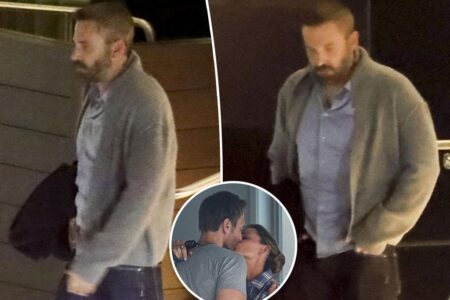Edwin S. Porter’s 1903 “The Great Train Robbery” is widely regarded as one of the first major narrative films — using a then-advanced clutch of techniques to tell a real, almost epic (at 12 minutes) story rather than simply to record a vignette. It also helped solidify the Western as a form specially suited to this new medium, even if it was shot in New York and New Jersey.
Telling a tale that begins that same year, Brian Skiba’s new “Gunslingers” is another “eastern Western,” shot in Kentucky. But the prolific writer-director’s latest provides an illustration of how the genre became somewhat fossilized via formulaic writing and overexposure even before 1950s television began churning out Western content in bulk. The modern-day equivalent of a Poverty Row “oater,” it’s more violent and profane than the sagebrush programmers of yore. Still, those factors can scarcely hide a serious lack of conviction or originality in this Lionsgate release, which arrives in theaters, digital and on-demand platforms April 11.
This is apparently Skiba’s 14th feature since the start of 2020 alone. The last (“Guns of Redemption”) came out just last month, and given its overlaps in theme and location, may well have been produced back-to-back with “Gunslingers.” That output’s general quality level suggests a good policy going forward would be “Slow down, pardner.” These films seem designed to check off a few standard boxes for genre entertainment, no more and no less. Still, the technical adequacy and familiar cast faces that make them passable time-killers don’t compensate for the lack of style, inspiration or novelty which would render that time enjoyable. They move along, yet without any sense of urgency or character involvement to rise above the pedestrian.
In 1903 New York City, a shootout occurs among well-dressed gents in a hotel or apartment suite. When his brother is threatened amidst the melee, Thomas Keller (Stephen Dorff) kills a man. Because that newly deceased party was “a Rockefeller,” aforementioned sibling Robert (Jeremy Kent Jackson) shouts, “You’ve doomed us all!” before suffering presumably fatal wounds himself.
Four years later, Thomas is living a furtive existence down south, constantly hounded by bounty hunters seeking “the largest reward in history” ($100,000) for his Rockefeller-slaying hide. He finds asylum in a town called Redemption, where the entire population is said to be “wanted, dead or alive.” Their game is to fake their own hangings and burials — all duly recorded by resident photographer Ben (Nicolas Cage) — then live on under aliases following a baptismal “rebirth” from local preacher-leader Jericho (Costas Mandylor).
It’s a decent premise. But “Gunslingers” spends scant time detailing that unique burg’s everyday workings or its citizens’ backstories before a giant posse turns up seeking Thomas. Heading them is none other than Robert Keller, who wasn’t killed after all, and now blames his big bro for abandoning him. (We never do find out how they managed to get into mortal conflict with a Rockefeller heir.) He doesn’t believe the hanging fiction, vowing he’ll wreak havoc on the locals until Thomas surrenders. Also in his crosshairs is wife Val (Heather Graham), who fled here with their daughter Grace (Ava Monroe Tadross) to find and warn Thomas herself. There are no prizes for guessing which Keller she really loves, or whose child Grace actually is.
Most of the film is a sustained shootout between reformed bad guys who’ve formed a loyal community — including characters played by Cooper Barnes, Randall Batinkoff, Scarlet Stallone, Tzi Ma, Bre Blair, Laurie Love, Mohamed Karim, Forrest Wilder and William McNamara — and red-kerchief’d representatives of the law who are nonetheless the real bad guys here. A smirking, cackling villain with an eyepatch and burn scars, Robert is obviously not going to honor any deal he makes to apprehend his brother, murdering in cold blood people he’d just promised to let go free.
So there’s not a lot of psychological suspense here. Nor is there much of the more physical kind, despite myriad stunt personnel cascading off porches and second-story balconies with lethal bullet wounds. Even when there’s a situation with high promise for tension, as in several figures’ extended ordeal at the gallows later on, Skiba’s staging and editing fail to make much of it.
“Gunslingers” is not the finest hour for any actor involved, though they run the gamut from competency to simply being too modern in look and manner to convince in a period setting that already feels like some sort of western cosplay weekend. The director-writer’s dialogue doesn’t help in that department, either. Most performers here do the best they can, to variable results, but the material draws considerably less than personal-bests from wide-eyed Graham and a hammy Jackson. As for Cage, he’s in full goof-off mode, which can be great fun or greatly wearing depending on where whimsy leads him. This particular combination of Walter Brennan-like comedy sidekick shtick and a strangled ancient-bluesman voice approach comes off as a failed improv idea that is tiresome from the get-go.
Goosed by a couple gratuitous interludes of gory amateur surgery, the movie is eventful, with a high body count. But there’s never the baseline authenticity of atmosphere or character depth that might make so much action meaningful, or even particularly exciting. Production values are adequate, apart from the occasional iffy digital effect. Patrice Lucien Cochet’s widescreen cinematography, however, has a muted color scheme that renders the images rather drab. Richard Patrick’s score tends toward a thundering intensity the unpersuasive dramatics don’t justify, its bombastic approach extending to no less than three clodhopping rawk tunes under the closing credits.
Read the full article here








